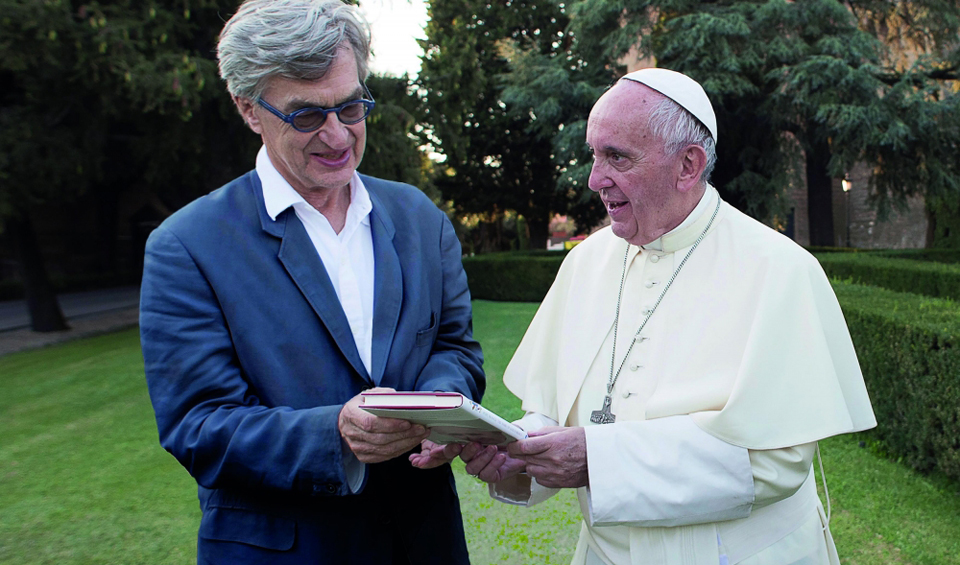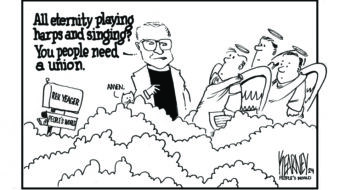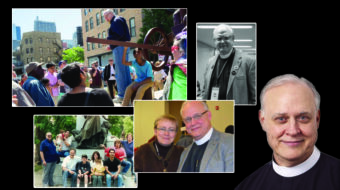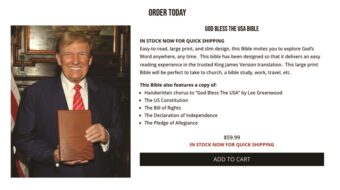
This documentary, produced and directed by Wim Winders, features a different type of Catholic pope. Pope Francis is not anyone the world is accustomed to, a spiritual leader known for such traditional exercises as the laying on of hands, receiving communion, and kissing babies. Pope Francis does do all of those things—which are what popes do. But he goes further by taking the chance of putting his reputation on the line when he speaks out on current events like climate change, the rich being responsible for taking care of the poor, the value of family time, fair wages, and peaceful resolution of conflict.
The film opens with scenes reminiscent of a World War II movie: black and white still images of Catholic friars and monks, and scenes of the atom bomb attacks on Japan and the Vietnam War. Right after, Pope Francis begins to talk calmly about the world’s crises. As a voice speaks from a Christian cross, this is where a viewer starts to realize that this is not about the pope per se. It is about his anger at the world’s rich and how they are literally upending the earth’s natural resources in practically every country, leaving the poor to starve and die as they scramble to earn a living and maintain their dignity.
Jorge Mario Bergoglio was born on December 17, 1936, to Italian immigrant parents who left Mussolini’s Italy for Buenos Aires, Argentina. The future Pope Francis did not start out as a religious minister or pastor, but rather began his education in chemistry to become a chemical technician. From there he worked in the food processing industry, but in time felt his calling to the church. His education turned to humanities and philosophy; he later taught these subjects in high school. He was ordained a priest in 1969 after obtaining his degree in theology, took his final vows in the Jesuit order in 1973, then served as head of the Jesuit province of Argentina from 1973-79.
The original Francis of Assisi was known for his strong prayer that everyone try to understand their fellow human being. Pope Francis wanted above all to take care of the poor. He did not care for the fancy, expensive ceremonial “pomp and circumstance” enjoyed by previous popes. Francis wanted to be like his namesake, and is the first pope to assume that name. He began a resonant campaign to communicate that the rich, the powerful and in many ways unjust corporations must start assuming their responsibility to address climate change, and how we are going to feed the poor.
In 2015, he made a visit to the United States to address a joint session of Congress and President Barack Obama. From that podium, he gave a somber admonition of the sordid role that capitalism plays in polluting the air, land and water throughout the world, and how this can only result in a permanent ecological catastrophe. He stipulated that these disasters—famine, floods, melting of the Arctic— are primarily, if not all, man-made. He shows controlled anger at the extinction of so many wild animals, as well as many of the smaller creatures. Pope Francis also warned that these creatures will be gone from our earth forever, if our attitudes toward the environment do not change.
He warned the leaders of the U.S. that our world is under constant threat of destruction emanating from the hands of the very few, while saying that major corporations are not the masters of the earth, but should take on the role of being its caretakers.
Republicans responded by saying that the Pope should not be meddling in matters not of his concern, such as science and politics.
Pope Francis is shown traveling throughout the world, from Southeast Asia to countries in Africa to jails in the United States to farms in South America, as huge crowds welcomed him enthusiastically, waiting patiently to receive his blessings and his message of quiet resistance. “No one can serve two masters,” he says, “we either serve God or we serve money.”
The film also shows the pope giving his opinions on some highly controversial topics, for instance, that he only recognizes marriage between a man and a woman. Although he expresses zero tolerance for child molestation, he did not recommend any punishment for the priests who were guilty of such actions, except to bar them from the priesthood for the remainder of their lives.
Overall, this documentary depicts a man trying to actively change the attitudes of the rich and powerful, and attempting in his own way to make this world a better place for all its inhabitants. The trailer can be viewed here. An interview with the director is here. Its theatrical run was brief, but it will undoubtedly be available on other platforms shortly.
Pope Francis: A Man of His Word
Documentary by Wim Wenders, 96 minutes












Comments